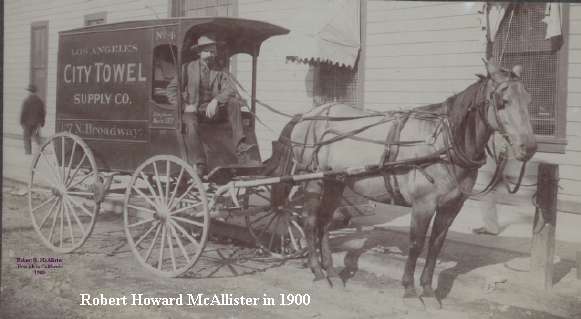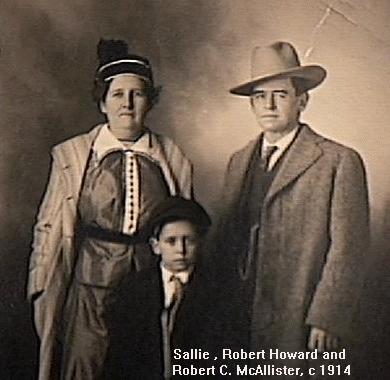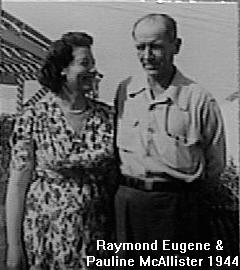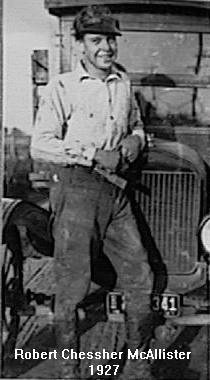Robert Howard McAllister
April 24, 1867 - September 12, 1949
By Robert Chessher McAllister II, his grandson
 My first memory of Grandaddy is of him sitting on a gunny sack full of chicken feed in the old shed out back on our ranch. He always wore blue bib overalls and a floppy, nondescript hat. He smoked hand rolled Bull Durham cigarettes. He would take out the little bag and then lick his thumb to remove one of the wheat straw papers that were attached to the bag. After opening the bag and shaking the tobacco out into the paper, he would use both thumbs to get the ends tucked in. Once he got it started, he would finish it with one hand and then lick it, all in one motion. It was only many years later that I realized the dexterity and practice this must have taken.
My first memory of Grandaddy is of him sitting on a gunny sack full of chicken feed in the old shed out back on our ranch. He always wore blue bib overalls and a floppy, nondescript hat. He smoked hand rolled Bull Durham cigarettes. He would take out the little bag and then lick his thumb to remove one of the wheat straw papers that were attached to the bag. After opening the bag and shaking the tobacco out into the paper, he would use both thumbs to get the ends tucked in. Once he got it started, he would finish it with one hand and then lick it, all in one motion. It was only many years later that I realized the dexterity and practice this must have taken.
Grandaddy spent a good portion of his time out in that shed. He and Grandma lived with Mother, Daddy, my younger brother, Walter Howard, and me on the ranch near Hemet. My grandparents had pooled their savings with my parents to purchase the ranch in 1947. The understanding was that Robert Howard and Sally Mittie (Jo) would have a place to live out their days and it happened exactly that way. Anyway, Daddy and Grandaddy were building a second house along side ours, for the old folks, when they got a little spare time.
There wasn't much spare time, however, what with taking care of 45 head of cattle, 25 or 30 sheep, a few goats, chickens and ducks, pigs, and raising irrigated crops. Until that house was finished, they lived in the old house with the rest of us. I guess it was crowded but, being only 3 or 4 years old, I could not tell. Anyway, it seems Grandma would not let Grandaddy smoke in the house even though both my parents smoked. So Grandaddy would shuffle out to the feed shed for a smoke. I learned much later from Mom that she would make sure he had a little bottle of sauterne wine to squirrel away out there, too. The weather in southern California is quite mild so he spent a fair bit of time out there. Since Grandma didn't go out to the feed shed at all, it was probably quiet too.
Other things would intrude on his quiet. That old shed had a galvanized metal roof. My little brother and I would sneak up to the shed and toss little rocks on top. What a racket! Then Grandaddy would come out, yell and shake his fist and we would run like crazy. Mother later told me he thought it was funny but he played the game as if he was really angry.
He was raised working and worked all his life. Even sitting in that shed, he was always busy. Years later, as a teenager, I found a wooden box full of rusty, bent nails in the barn. I asked my dad why they were being kept. He said they were from an old shed that was torn down in 1948. Remember, when Grandaddy was a kid, it was not long after Reconstruction, in the deep south. Commodities, like nails, were scarce as hen's teeth. All old bent nails were saved and straightened for reuse. This was just a box Grandaddy hadn't gotten to before he died.
He was raised to be frugal, too. Until we moved away from the ranch in 1965, the sheet metal latches on the chicken coops were still the ones he made from flattened tin cans. The edges were rolled back for safety and a cut off nail makes a good rivet. He also made rabbit feeders out of large cans for the hoppers and pie tins for the feeder portion. The hinges on the chicken coop doors were made from old harness leather. He nailed tin can lids over knot holes to keep mice out of the feed.
One particular day I went out to visit him in the shed and, pointing to some rusty steel traps hanging on the wall, asked what they were. He told me and offered to show me how they worked. The trap looked large but was (I learned later) only a #1 Victor, with a single spring. He set the trap and sent me to fetch a twig outside. When he sprung that trap on that twig, I couldn't believe my eyes! It was so fast. After that, I guess I made a pest of myself for a while, wanting to see the trap snap again.
He held many jobs in his lifetime. He told of helping on a boat on the Mississippi River. Someone on board had caught several large catfish and tossed them on the deck to die. A few hours later, he was assigned to put them in a tub of water in preparation to skinning them (catfish do not have scales). The fish were dead and stiff. After they soaked a while he reached in for one and about jumped out of his hide. The fish were all alive and swimming around in the tub. He later learned that this is not unusual for a catfish but he did not know it then.
He was raised in Mississippi amid traditions of, among others, family honor. A reporter for the local newspaper (so the family story goes) apparently wrote an article that was judged to be an insult to the family honor. Being young and impetuous, he went after the reporter. He finally found the reporter and, in the ensuing discussion, shot the reporter. The reporter was expected to die. So, with a murder charge hanging over his head he headed out for Texas. As it turned out, the reporter did not die and no murder charge was ever filed. He did not return from Texas, however, because he met and married my grandmother, Sallie Mittie Chessher there, in 1894. She was the daughter of Daniel Simpson and Elizabeth Roberts (nee Daughtrey) Chessher of Georgetown.
 Robert Howard McAllister, his wife and (then) only child, Raymond Eugene, and her parents, moved to California in 1900, probably because of the hurricane that wiped Galveston off the map. This early picture shows Grandaddy in a Los Angeles City Towel delivery wagon. It was his first job after moving to California.
Robert Howard McAllister, his wife and (then) only child, Raymond Eugene, and her parents, moved to California in 1900, probably because of the hurricane that wiped Galveston off the map. This early picture shows Grandaddy in a Los Angeles City Towel delivery wagon. It was his first job after moving to California.
In 1907, when their son, Raymond, was thirteen years old, Grandma developed a tumor in her abdomen. For several months they prepared for the worst. Then the "tumor" turned out to be my father, Robert Chessher. They were ecstatic.
Now, Robert Chessher McAllister, my father, was quite a guy. He had high principles and was...... But, then, that is another story for another time.
 Robert Howard McAllister was born 24 Apr 1867 in Mississippi, married Sallie Mittie (Jo) Chessher on 23 May 1894 in Taylor, TX and died 12 Sep 1949 in Hemet, Riverside County, California.
Robert Howard McAllister was born 24 Apr 1867 in Mississippi, married Sallie Mittie (Jo) Chessher on 23 May 1894 in Taylor, TX and died 12 Sep 1949 in Hemet, Riverside County, California. Sallie Mittie (Jo) Chessher was born 23 Feb 1872 (69?) in Texas and died 17 Oct 1951 in Hemet, Riverside County, California. They had two sons, Raymond Eugene McAllister and Robert Chessher McAllister.
Sallie Mittie (Jo) Chessher was born 23 Feb 1872 (69?) in Texas and died 17 Oct 1951 in Hemet, Riverside County, California. They had two sons, Raymond Eugene McAllister and Robert Chessher McAllister. Raymond Eugene McAllister, born 6 Oct 1896, d ? Aug 1964.
Raymond Eugene McAllister, born 6 Oct 1896, d ? Aug 1964.  Robert Chessher McAllister (my father), born 9 Jan 1908 in Los Angeles, CA and died 28 Jul 1987 in Hemet, Riverside County, California.
Robert Chessher McAllister (my father), born 9 Jan 1908 in Los Angeles, CA and died 28 Jul 1987 in Hemet, Riverside County, California.

